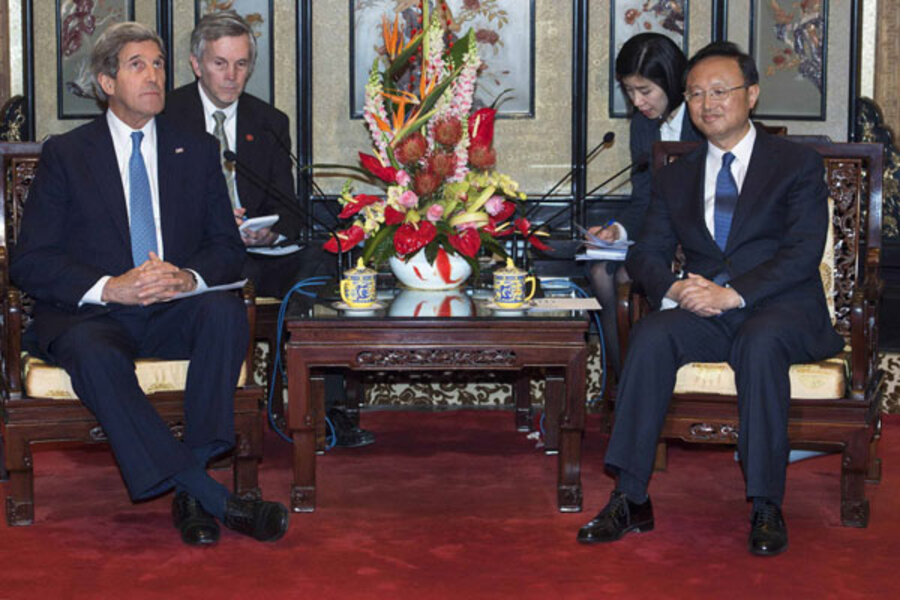North Korea tension puts pressure on China, US
Loading...
Bound by threats from North Korea, the U.S. and China agreed Saturday to rid the bellicose nation of nuclear weapons in a test of whether the world powers can shelve years of rivalry and discord, and unite in fostering global stability.
Beyond this latest attempt to restrain North Korea, the burgeoning nuclear crisis has so frustrated the U.S. and China that they are forming a new and tentative bond with the potential to carry over into areas that have vexed them for decades.
But they will need to overcome the longstanding prickly relations between Beijing's communist government and Washington's free-market democracy. The two are economic competitors, and China is far more reluctant than the U.S. to intervene in international military conflicts.
U.S. Secretary of State John Kerry on Saturday described a "synergy" between the two countries to achieve worldwide security and economic stability.
"We have a stake in China's success. And frankly, China has a stake in the success of the United States," Kerry told reporters in the Chinese capital. "And that became clear in all of our conversations here today. A constructive partnership that is based on mutual interest benefits everybody in the world."
Kerry met with the new Chinese leaders to discuss a range of issues, most notably the persistent and increasingly pitched threats that North Korea has issued against the U.S., South Korea and Japan the over the past several months.
North Korea appears to be readying a missile test, in what the U.S. says would be its third since December, and there are varying opinions in Washington as to whether the North is able to develop and launch nuclear-tipped missiles.
One U.S. intelligence assessment suggested North Korea had the capacity to put a nuclear warhead on a missile, even if any such weapon would have low reliability.
Kerry and the Chinese foreign policy chief, State Councilor Yang Jiechi, said the two nations would work together to create a nuclear-free Korean peninsula, effectively forcing North Korea to give up its arsenal.
The reclusive North Korean government and its young leader, Kim Jong Un, are more likely to listen to China, its main economic and diplomatic partner and lifeline to the outside world, than anyone else.
Yang, through an interpreter, described China's stance on North Korea as "clear cut" and called for resuming the six-nation talks that fell apart four years ago and are aimed at ending the nuclear threat.
"China is firmly committed to upholding peace and stability and advancing the denuclearization process on the Korean peninsula," Yang told reporters. "We maintain that the issue should be handled and resolved peacefully through dialogue. ... To properly address the Korean nuclear issue serves the interests of all parties."
But Kerry made clear that the U.S. would keep close watch on how China continues to deal with North Korea to "make sure this is not rhetoric but that this is real policy."
North Korea was but one issue that was high on the priority list of discussions, Kerry said.
China and the U.S. have the two most powerful economies and are two of the largest energy users. They agreed to hold high-level talks on climate change and to ease business investment cooperation.
Kerry also raised the possibility of scaling back America's military presence in the Asia-Pacific region once the Korean nuclear crisis is resolved. Beijing has been disgruntled about U.S. missile defense systems in China's backyard.
"Obviously, if the threat disappears," meaning a nuclear-free North Korea, "the same imperative does not exist at that point in time for us to have that kind of robust, forward-leaning posture of defense," Kerry said. "And it is our hope in the short run that we can address that."
Western experts predict that China will move slowly and cautiously, if at all, toward becoming a more reliable U.S. ally. China remains deeply skeptical of President Barack Obama's policy shift to Asia, which Beijing views as U.S. attempts to contain its economic might.
It's also unlikely that China will sever its long ties with North Korea. The Chinese dramatically have boosted trade with their neighbors and maintain close military relations some six decades after they fought side by side in the Korean War. They provide North Korea with most of its fuel and much of its food aid.
China has a history of quickly reversing course after talking tougher with North Korea. In late 2010, as American officials were praising Beijing for constructive efforts after the North shelled a South Korean island, a Chinese company agreed to invest $2 billion in a North Korean industrial zone.
"The U.S. has to be cautious in expecting a major breakthrough on North Korea out of the new Chinese leadership," said Christopher Johnson, a former CIA analyst who is now a China expert at the Center for Strategic and International Studies in Washington. "There's a risk of too much exuberance on the U.S. side. ... The Chinese just can't turn the battleship as quickly as we might like."
But Johnson said even minor progress on North Korea could translate into a warming between Washington and Beijing, which appears now to be "at least willing to talk."
"If we can talk on an issue that is as sensitive as an issue as North Korea, we can talk about other issues," Johnson said. "It speaks very well for other touchy issues in the relationship at the moment."







